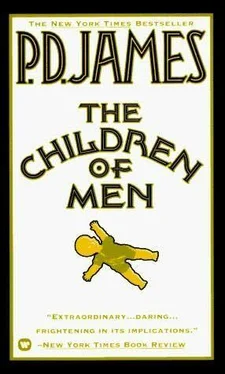Horror and guilt subsumed grief. Perhaps if Helena had been able to say, “It’s worse for you, darling,” or “It’s as bad for you, darling,” we might have salvaged something from the wreckage of a marriage which from the start hadn’t been particularly seaworthy. But of course she couldn’t; that wasn’t what she believed. She thought that I cared less, and she was right. She thought that I cared less because I loved less, and she was right about that too. I was glad to be a father. When Helena told me she was pregnant I felt what I presume are the usual emotions of irrational pride, tenderness and amazement. I did feel affection for my child, although I would have felt more had she been prettier—she was a miniature caricature of Helena’s father—more affectionate, more responsive, less inclined to whine. I’m glad that no other eyes will read these words. She has been dead for almost twenty-seven years and I still think of her with complaint. But Helena was obsessed by her, totally enchanted, enslaved, and I know that what spoiled Natalie for me was jealousy. I would have got over it in time, or at least come to terms with it. But I wasn’t given time. I don’t think Helena ever believed that I’d run Natalie over on purpose, at least not when she was rational; even at her most bitter she managed to prevent herself from saying the unforgivable words, as a woman burdened with a sick and cantankerous husband, out of superstition or a remnant of kindness, will bite back the words, “I wish you were dead.” But, given the chance, she would rather have had Natalie alive than me. I’m not blaming her for that. It seemed perfectly reasonable at the time and it seems so now.
I would lie distanced in the king-sized bed waiting for her to fall asleep, knowing that it might be hours before she did, worrying about next day’s over-filled diary, about how, with the prospect of endless broken nights, I would be able to cope, reiterating into the darkness my litany of justification—“For Christ’s sake, it was an accident. I didn’t mean to do it. I’m not the only father to have run down his child. She was supposed to be looking after Natalie, the child was her responsibility, she made it plain enough it wasn’t mine. The least she could have done was to look after her properly. “ But angry self-justification was as banal and irrelevant as a child’s excuse for breaking a vase.
We both knew that we had to leave Lathbury Road. Helena said: “We can’t stay here. We should look for a house near the centre of the city. After all, that’s always what you’ve wanted. You’ve never really liked this place.”
The allegation was there but unspoken: you’re glad that we’re moving, glad that her death has made it possible.
Six months after the funeral we moved to St. John Street, to a tall Georgian house with a front door on the street, where parking is difficult. Lathbury Road was a family house; this is a house for the unencumbered, if agile, and the solitary. The move suited me because I liked being close to the city centre, and Georgian architecture, even speculative Georgian requiring constant maintenance, has a greater cachet than Edwardian. We hadn’t made love since Natalie’s death but now Helena moved into her own room. It was never discussed between us but I knew that she was saying that there would be no second chance, that I had killed not only her beloved daughter but all hope of another child, of the son she suspected I had really wanted. But that was in October 1994 and the choice was no longer there. We didn’t stay permanently apart, of course. Sex and marriage are more complicated than that. From time to time I would cross the few feet of carpeted floor between her room and mine. She neither welcomed me nor rejected me. But there was a wider, more permanent gulf between us and that I made no effort to cross.
This narrow, five-storeyed house is too large for me, but with our falling population I’m hardly likely to be criticized for not sharing my over-provision. There are no undergraduates clamouring for a bed-sitting-room, no young homeless families to prick the social conscience of the more privileged. I use it all, mounting from floor to floor through the routine of my day, as if methodically stamping my ownership on vinyl, on carpet and rugs and polished wood. The dining-room and kitchen are in the basement, the latter with a wide arc of stone steps leading to the garden. Above them, two small sitting-rooms have been converted into one which also serves as a library, a television-and-music room and a convenient place in which to see my students. On the first floor is a large L-shaped drawing-room. This too has been converted from two smaller rooms, the two discordant fireplaces proclaiming its former use. From the back window I can look out over the small walled garden with its single silver birch tree. At the front, two elegant windows, ceiling—high, with a balcony beyond, face St. John Street.
Anyone pacing between the two windows would have little difficulty describing the room’s owner. Obviously an academic; three walls are lined with bookshelves from ceiling to floor. A historian; the books themselves make that plain. A man concerned primarily with the nineteenth century; not only the books but the pictures and ornaments proclaim this obsession: the Staffordshire commemorative figures, the Victorian genre oil paintings, the William Morris wallpaper. The room, too, of a man who likes his comfort and who lives alone. There are no family photographs, no board games, no disarray, no dust, no feminine clutter, little evidence, indeed, that the room is ever used.
And a visitor might guess, too, that nothing here is inherited, everything acquired. There are none of those unique or eccentric artefacts, valued or tolerated because they are heirlooms, no family portraits, undistinguished oils given their place to proclaim ancestry. It is the room of a man who has risen in the world, surrounding himself with the symbols both of his achievements and his minor obsessions. Mrs. Kavanagh, the wife of one of the college scouts, comes in three times a week to clean for me and does it well enough. I have no wish to employ the Sojourners to whom, as ex-adviser to the Warden of England, I am entitled.
The room I like best is at the top of the house, a small attic room with a charming fireplace in wrought iron and decorated tiles, furnished only with a desk and chair and containing the necessities for making coffee. An uncurtained window looks out over the campanile of St. Barnabas Church to the far green slope of Wytham Wood. It is here I write my diary, prepare my lectures and seminars, write my historical papers. The front door is four storeys down, inconvenient for answering the doorbell; but I have ensured that there are no unexpected visitors in my self-sufficient life.
Last year, in March, Helena left me for Rupert Clavering, thirteen years younger than she, who combines the appearance of an over-enthusiastic rugby player with, one is forced to believe, the sensitivity of an artist. He designs posters and dust jackets and does them very well. I recall something she said during our pre-divorce discussions, which I was at pains to keep unacrimonious and unemotional: that I had slept with her only at carefully regulated intervals because I wanted my affairs with my students to be driven by more discriminating needs than the relief of crude sexual deprivation. Those weren’t, of course, her words, but that was her meaning. I think she surprised both of us by her perception.
The task of writing his journal—and Theo thought of it as a task, not a pleasure—had become part of his over-organized life, a nightly addition to a weekly routine half imposed by circumstance, half deliberately devised in an attempt to impose order and purpose on the shapelessness of existence. The Council of England had decreed that all citizens should, in addition to their ordinary jobs, undertake two weekly training sessions in skills which would help them to survive if and when they became part of the remnant of civilization. The choice was voluntary. Xan had always known the wisdom of giving people a choice in matters where choice was unimportant. Theo had elected to do one stint in the John Radcliffe Hospital, not because he felt at home in its antiseptic hierarchy or imagined that his ministrations to the sick and aged flesh which both terrified and repelled him was any more gratifying to the recipients than it was to him, but because he thought the knowledge gained might be the most personally useful, and it was no bad idea to know where, should the need arise, he could with some cunning lay his hands on drugs. The second two-hour session he spent more agreeably on house maintenance, finding the good humour and crude critical comments of the artisans who taught there a welcome relief from the more refined disparagements of academe. His paid job was teaching the full- and part-time mature students who, with the few former undergraduates doing research or taking higher degrees, were the University’s justification for its existence. On two nights a week, Tuesday and Friday, he dined in Hall. On Wednesday he invariably attended the three o’clock service of Evensong in Magdalen Chapel. A small number of colleges with more than usually eccentric collegers or an obstinate determination to ignore reality still used their chapels for worship, some even reverting to the old Book of Common Prayer. But the choir at Magdalen was among the best regarded and Theo went to listen to the singing, not to take part in an archaic act of worship.
Читать дальше












